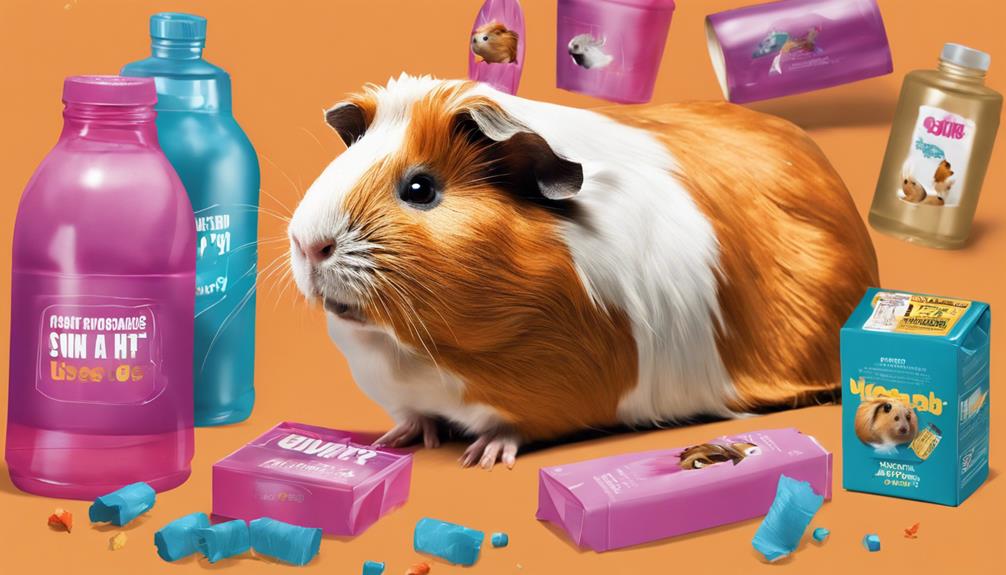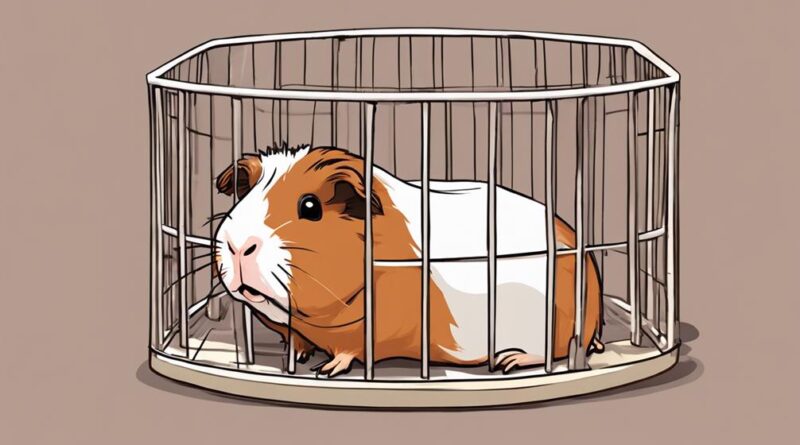Why Do Common Guinea Pig Misconceptions Exist?
You may have noticed how some common misconceptions about guinea pigs persist despite the availability of accurate information.
Have you ever wondered why these misunderstandings continue to circulate widely?
There are various factors contributing to the prevalence of these misconceptions, ranging from historical origins to the influence of popular media and cultural stereotypes.
However, the deeper reasons behind these misconceptions might surprise you.
Historical Origins of Misconceptions
Many misconceptions about guinea pigs stem from historical anecdotes that have been passed down through generations. These small, adorable creatures have a fascinating history that has led to the evolution of misconceptions over time.
Guinea pigs, native to South America, were first domesticated by the Incas over 3,000 years ago. The Incas kept guinea pigs for both food and religious ceremonies, leading to the belief that they were only meant for consumption. This historical practice laid the foundation for the misconception that guinea pigs are primarily food sources rather than beloved pets.
Furthermore, during the 16th century, European explorers brought guinea pigs back to Europe, where they became popular exotic pets among the wealthy. However, due to a lack of understanding about their care needs, many guinea pigs suffered in captivity, perpetuating the misconception that they're fragile or high-maintenance animals.
As guinea pigs became more widespread as pets in the 19th and 20th centuries, various myths and misconceptions surrounding their behavior and care emerged. Stories of guinea pigs being aggressive or dirty animals have persisted through time, often overshadowing the true nature of these gentle and clean creatures.
Understanding the origins and evolution of these misconceptions is crucial in dispelling myths and promoting accurate knowledge about guinea pigs as delightful companions.
Lack of Proper Education
The historical misconceptions surrounding guinea pigs have persisted due to a lack of proper education about their true nature and care requirements. When it comes to owning guinea pigs, it's essential to have accurate information to provide them with the best possible care.
- Educational Resources: Many misconceptions arise from the lack of accessible and accurate educational resources about guinea pigs. Without proper guidance, individuals may unknowingly perpetuate myths and misinformation about these small pets.
- Misinformation: Misinformation spreads easily, especially in the age of the internet. False facts about guinea pig care can circulate rapidly, leading to widespread misunderstandings about their needs and behaviors.
- Pet Ownership Misconceptions: Some misconceptions stem from a general lack of understanding about responsible pet ownership. Guinea pigs have specific needs that differ from other common pets, and without proper education, these requirements can be overlooked or misunderstood.
Influence of Popular Media
Popular media plays a significant role in shaping perceptions and knowledge about guinea pigs among the general public. When celebrities endorse a particular type of guinea pig product, it can create a bias towards that specific brand or type of care. This bias can influence individuals to believe that certain products are superior without considering other options that may be more suitable for their guinea pig's needs.
Internet forums also contribute to the spread of misinformation about guinea pigs. Hearsay and anecdotal evidence shared on these platforms can quickly become accepted as facts, even if they aren't based on scientific research or proper guinea pig care guidelines. This perpetuates misconceptions and leads to the dissemination of inaccurate information.
It's essential to critically evaluate the information presented in popular media regarding guinea pigs. Just because a celebrity endorses a product or a particular piece of advice is widespread on internet forums doesn't necessarily mean it's the best choice for your guinea pig. Take the time to research and consult reliable sources to ensure you're providing the best care for your furry companion.
Cultural Stereotypes and Beliefs
Exploring cultural stereotypes and beliefs can provide valuable insights into how misconceptions about guinea pigs are perpetuated in society. Stereotypical assumptions and cultural biases play a significant role in shaping how people perceive and interact with these small animals. Here are some key points to consider:
- Historical Representations: Throughout history, guinea pigs have been depicted in various cultural contexts, often reinforcing stereotypes that may not accurately reflect their true nature. These depictions can influence how individuals view guinea pigs today.
- Traditional Beliefs: In some cultures, there are traditional beliefs or superstitions surrounding guinea pigs that contribute to misconceptions about them. These beliefs may lead to misunderstandings about their behavior or care requirements.
- Cultural Practices: Different cultures may have specific practices or customs related to guinea pigs that impact how they're perceived. These practices can sometimes perpetuate misconceptions or lead to biased views about these animals.
Lack of Understanding Guinea Pig Behavior
Understanding guinea pig behavior can be challenging for many individuals due to their unique communication methods and social interactions. Guinea pigs exhibit socialization challenges that can lead to misunderstood behaviors. Unlike dogs or cats, they communicate through subtle cues such as squeaks, purrs, and body language. These communication cues can be misinterpreted, resulting in confusion about their needs and emotions.
Behavioral differences between guinea pigs and more common household pets contribute to the misunderstanding of their behaviors. For example, guinea pigs are prey animals, so they may be naturally more cautious and skittish compared to predators like dogs. This wariness can be misconstrued as unfriendliness or fear, leading to misinterpretations of their true intentions.
Guinea pigs also have specific socialization needs that may not align with traditional pet expectations. They thrive in the company of their own kind, and solitary guinea pigs may exhibit behaviors like excessive hiding or aggression. These socialization challenges can be overlooked, resulting in guinea pigs not receiving the necessary companionship for their well-being.
Veterinary Misinformation
Misconceptions about guinea pigs often stem from veterinary misinformation. When it comes to their health and treatment, there are several areas where misunderstandings can occur:
- Misunderstood Health: Guinea pigs are prone to certain health issues like dental problems, respiratory infections, and scurvy due to their specific dietary needs. Unfortunately, there's misinformation circulating about these conditions, leading to confusion among owners about how to best care for their pets.
- Treatment Misconceptions: Due to their small size and unique physiology, guinea pigs require specialized care when it comes to treatment. Some common misconceptions revolve around the dosage of medications, appropriate antibiotics, and even the signs of illness that owners should look out for. This misinformation can lead to delays in seeking proper veterinary care, which can be detrimental to the health of these small animals.
It's crucial to consult with a knowledgeable and experienced veterinarian who's expertise in treating guinea pigs to ensure that you receive accurate information about their health and well-being. By addressing these misunderstandings and seeking reliable veterinary advice, you can provide the best possible care for your guinea pig.
Misleading Marketing and Advertisements

When navigating the world of guinea pig products, be wary of misleading marketing and advertisements. False advertising and deceptive marketing strategies are unfortunately common in the pet industry, leading to misconceptions about the care and needs of guinea pigs. Some companies may exaggerate the benefits of certain products or make claims that aren't scientifically proven, causing confusion among guinea pig owners.
For instance, you might come across advertisements promoting guinea pig cages as 'extra spacious,' but in reality, these cages may not meet the minimum space requirements for guinea pigs to live comfortably. It's essential to research and consult reliable sources before making any purchases for your guinea pig to ensure they've a safe and suitable environment.
Additionally, be cautious of products that claim to provide miraculous health benefits for your guinea pig without any evidence to support these assertions. Some companies may market supplements or treats as essential for guinea pig health when, in fact, a balanced diet and proper veterinary care are the primary keys to keeping your furry friend healthy.
Social Media Amplification of Myths
Beware of the misinformation spread through social media platforms regarding guinea pig care. In today's digital age, it's easy for myths and misconceptions to spread like wildfire, leading to potentially harmful practices in caring for these small pets. Here's why you should be cautious:
- Influencer Endorsements: Influencers often have a significant impact on their followers' opinions and behaviors. Unfortunately, some influencers may not have the necessary expertise when it comes to guinea pig care, leading them to unintentionally propagate false information. Always fact-check and consult reliable sources before implementing any advice from influencers.
- Viral Videos: Viral videos showcasing unconventional or even harmful practices can quickly gain traction on social media. While these videos may be entertaining, they mightn't align with the best interests of your guinea pig. Remember that what goes viral isn't always synonymous with what's right.
- Misleading Content: With the ease of creating and sharing content online, misleading information can easily be disguised as factual. Be wary of sensationalized or exaggerated claims about guinea pig care, as they may lack scientific backing or proper expertise.
It's essential to critically evaluate the information you come across on social media platforms, especially when it concerns the well-being of your guinea pig. Double-check facts, consult reputable sources, and prioritize your pet's health above all else.
Frequently Asked Questions
Are Guinea Pigs Related to Pigs?
No, guinea pigs aren't related to pigs. Despite their name, guinea pigs actually have no relation to pigs. They're rodents native to South America and have no genetic connection to pigs.
The name 'guinea pig' likely comes from historical misunderstandings and confusion due to their introduction to Europe. So, rest assured, guinea pigs and pigs aren't part of the same family tree.
Can Guinea Pigs Survive in the Wild?
In the wild, guinea pigs would struggle to survive due to their domestication. They lack the necessary adaptations to protect themselves from predators. Guinea pigs have become reliant on humans for food and safety, making them ill-equipped to fend for themselves in the wild.
Their docile nature and lack of defensive mechanisms would put them at a significant disadvantage against natural predators.
Do Guinea Pigs Actually Need a Companion or Can They Live Alone?
Guinea pigs are social animals by nature and thrive in the company of their own kind. They benefit from having a companion to interact with, play, and groom each other. While they can survive alone, they may feel lonely and stressed without a friend.
Therefore, it's recommended to keep guinea pigs in pairs or groups to ensure they've a happy and enriching environment that meets their social needs.
Are Guinea Pigs Rodents?
Yes, guinea pigs are rodents. They belong to the rodent classification due to their evolutionary lineage. Rodents are characterized by their continuously growing incisors and other specific dental features, which guinea pigs possess.
Understanding this classification can help you learn more about your guinea pig's natural behaviors and needs as a rodent. It's fascinating how their lineage has shaped them into the adorable pets we love today.
Can Guinea Pigs Be Trained Like Other Pets?
Yes, guinea pigs can be trained like other pets. Guinea pig training can be rewarding but comes with some behavioral challenges. With patience and consistency, you can teach them tricks, use positive reinforcement, and even litter train them.
Understanding their natural behaviors and preferences is key to successful training. Remember to keep training sessions short and enjoyable for your guinea pig to ensure progress.
Conclusion
In conclusion, common misconceptions about guinea pigs exist due to historical origins, lack of education, influence of media, cultural stereotypes, misunderstanding of behavior, veterinary misinformation, misleading marketing, and social media amplification.
By educating yourself and others about these adorable pets, you can help dispel these myths and ensure that guinea pigs are properly cared for and appreciated. Remember, guinea pigs are unique animals that deserve love and respect just like any other pet.
